Did you know that some languages are spoken so quickly that listeners can barely keep up? Take Japanese, for instance, which often tops the charts in speech speed, with speakers averaging about 7.84 syllables per second.
The speed at which a language is spoken—often measured in words or syllables per minute—can reveal fascinating insights about cultural communication styles and cognitive processes.
In this blog post, we'll dive into the fastest spoken languages in the world, exploring what makes them so rapid, how they're measured, and what this speed means in various contexts.

What Is The Criteria For Determining Speed In A Language?
Speech Rate: Words per Minute (WPM)
One of the primary metrics used to determine the speed of a spoken language is the speech rate, typically measured in words per minute (WPM). This metric quantifies how many words a speaker can articulate within a minute. By analyzing speech patterns across different languages, researchers can identify which languages have a naturally faster pace of word delivery.
Syllable Rate: Syllables per Minute (SPM)
Another crucial metric is the syllable rate, measured in syllables per minute (SPM). This measure accounts for the complexity and phonetic structure of languages, as some languages use longer words with more syllables. By focusing on syllables, researchers gain a more nuanced understanding of speech speed that transcends the variability in word length across languages.
Methodology
To determine the fastest-spoken languages, researchers collect and analyze extensive linguistic data. This typically involves recording native speakers engaging in various types of speech, such as casual conversations, storytelling, and reading predefined texts. Advanced software is then used to transcribe these recordings and calculate the WPM and SPM. The data is often aggregated from multiple speakers to ensure accuracy and representativeness.
Researchers also consider factors like the speakers' ages, regional dialects, and speaking contexts to provide a comprehensive analysis of each language's speed. By synthesizing this data, they can accurately rank languages based on their spoken speed.
What Are The Fastest Spoken Languages In The World?
1. Japanese
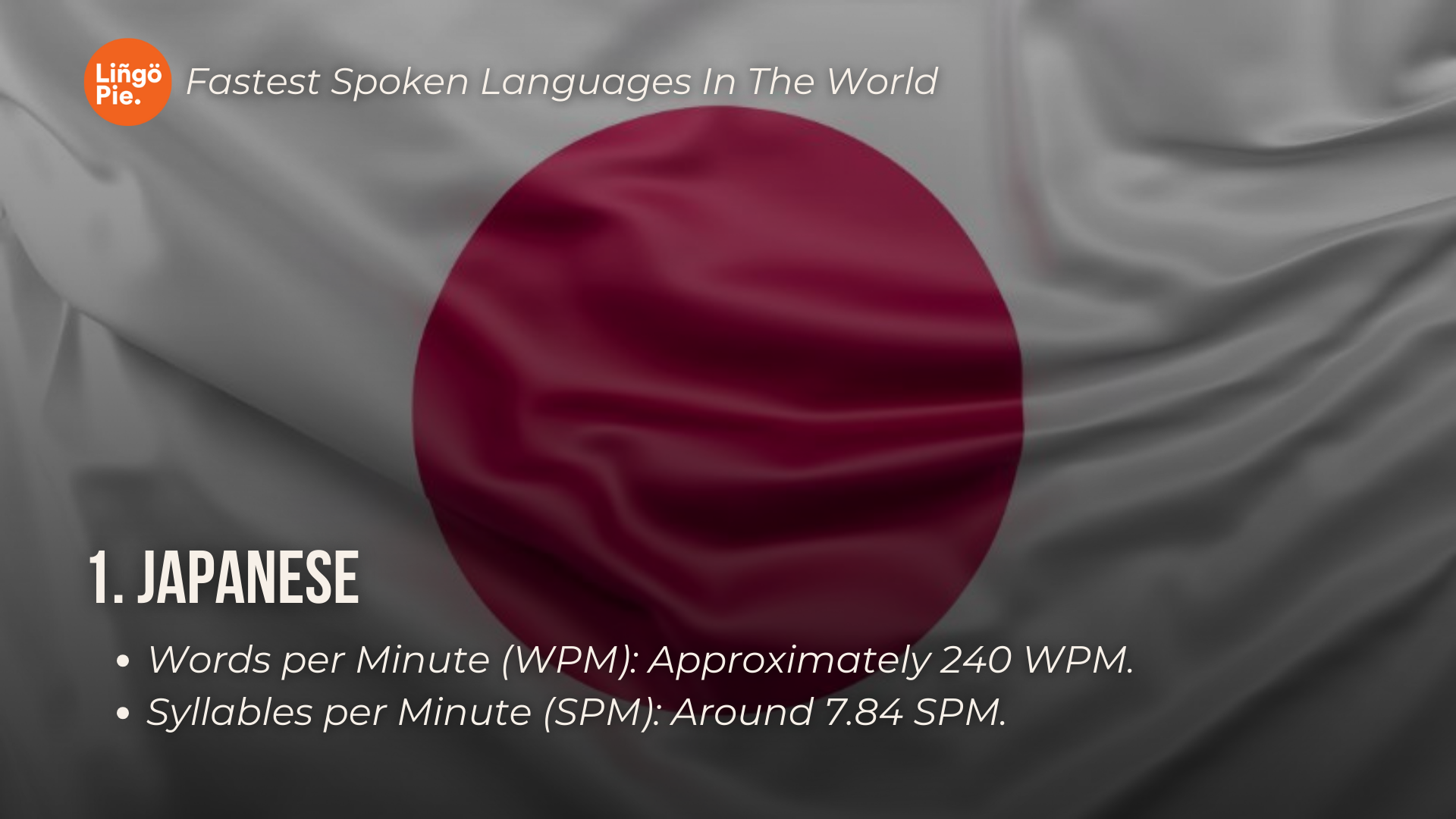
Japanese is the official language of Japan, spoken by over 125 million people. It has a rich history and is characterized by its use of three writing systems: Kanji, Hiragana, and Katakana.
Speed Statistics:
- Words per Minute (WPM): Approximately 240 WPM.
- Syllables per Minute (SPM): Around 7.84 SPM.
The fast pace of spoken Japanese reflects the efficiency and precision highly valued in Japanese culture. The language's syllabic structure, with many short and simple syllables, facilitates rapid speech. Additionally, the context-heavy nature of Japanese often requires fewer words to convey complex ideas, allowing speakers to communicate quickly and effectively.
2. Spanish
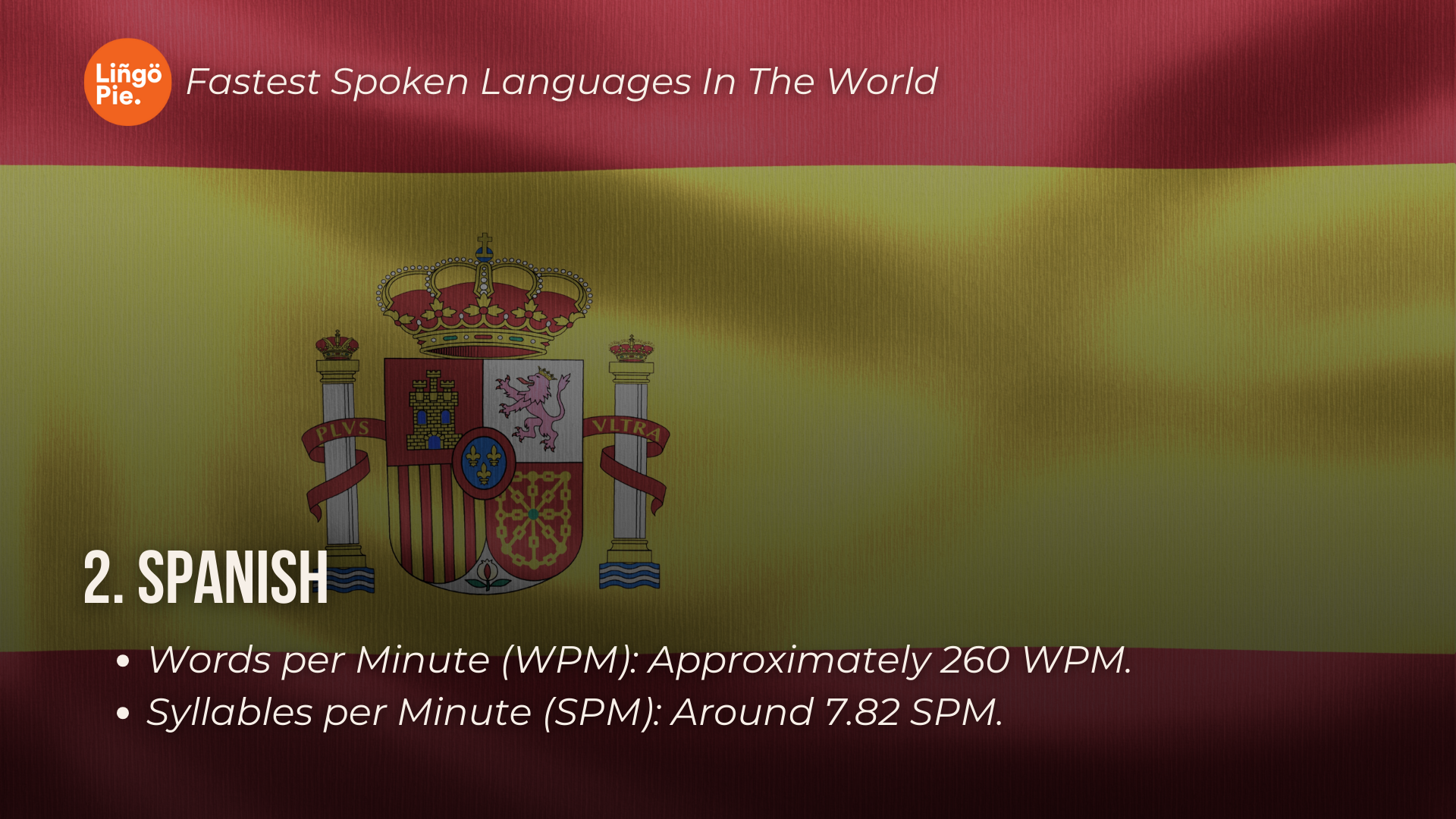
Spanish, or Español, is a Romance language spoken by over 460 million people as a native language, primarily in Spain and Latin America.
Speed Statistics:
- Words per Minute (WPM): Approximately 260 WPM.
- Syllables per Minute (SPM): Around 7.82 SPM.
Spanish's rapid speech rate can be attributed to its phonetic consistency and rhythmic syllable timing. In many Spanish-speaking cultures, lively and expressive communication is the norm, reflecting social norms that favor dynamic and engaging interactions. This vibrant communication style is mirrored in the language's swift articulation.
3. French
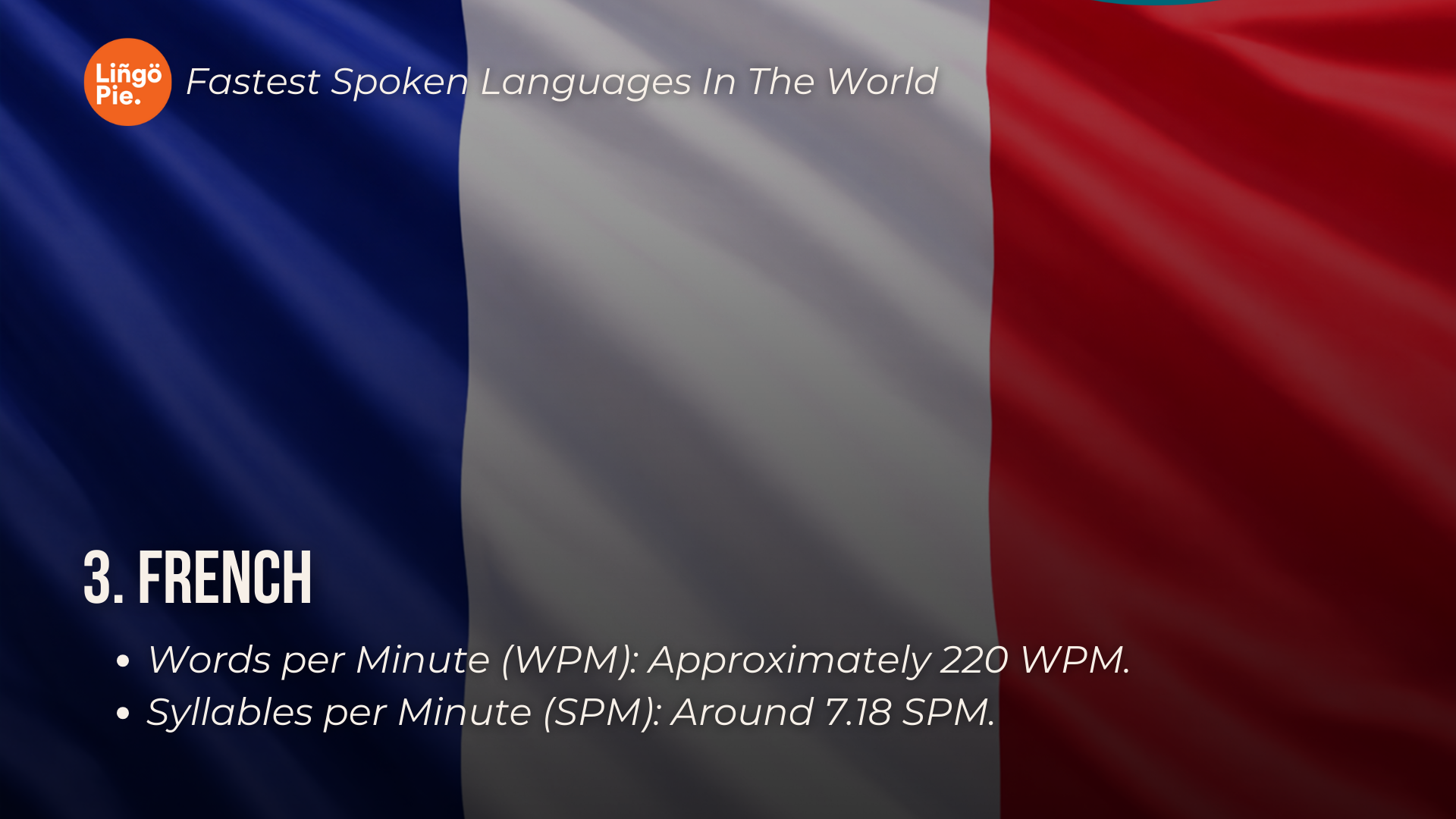
French is a Romance language spoken by approximately 77 million native speakers and used as a second language by millions more across the globe, particularly in France, parts of Canada, and several African countries.
Speed Statistics:
- Words per Minute (WPM): Approximately 220 WPM.
- Syllables per Minute (SPM): Around 7.18 SPM.
French's moderate but steady speech speed reflects the language's intricate structure and the cultural emphasis on clarity and eloquence. The French value articulate and precise communication, which influences the way the language is spoken. The relatively high syllable rate also highlights the rhythmic and melodic nature of spoken French.
4. Italian
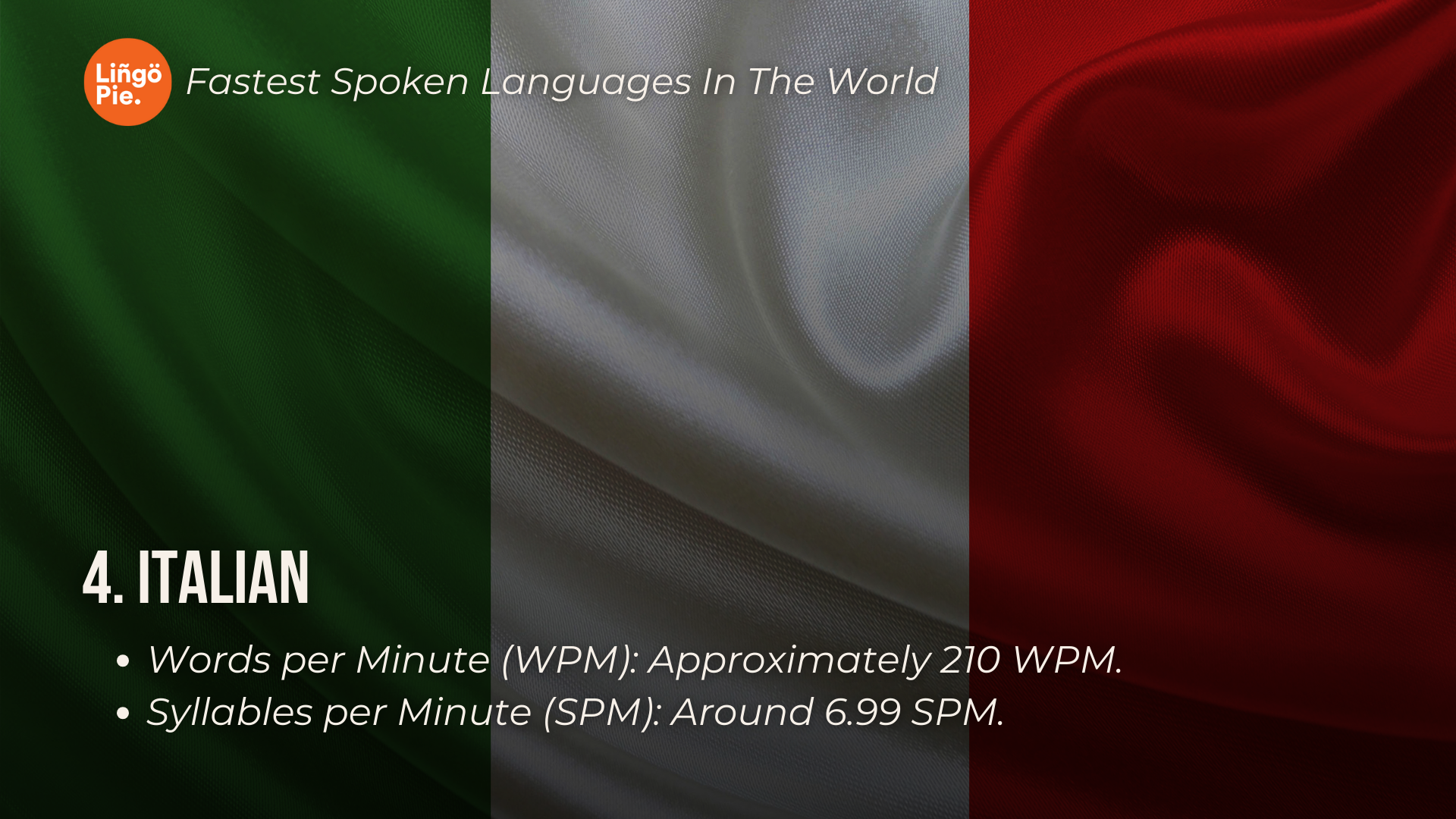
Italian, another Romance language, is spoken by about 65 million people, primarily in Italy and parts of Switzerland.
Speed Statistics:
- Words per Minute (WPM): Approximately 210 WPM.
- Syllables per Minute (SPM): Around 6.99 SPM.
The rapid and expressive nature of spoken Italian mirrors the lively and passionate Italian culture. Italian's phonetic clarity and regularity make it easy to speak quickly without losing meaning. This speed facilitates the animated and emphatic conversational style common in Italian social interactions.
5. Portuguese
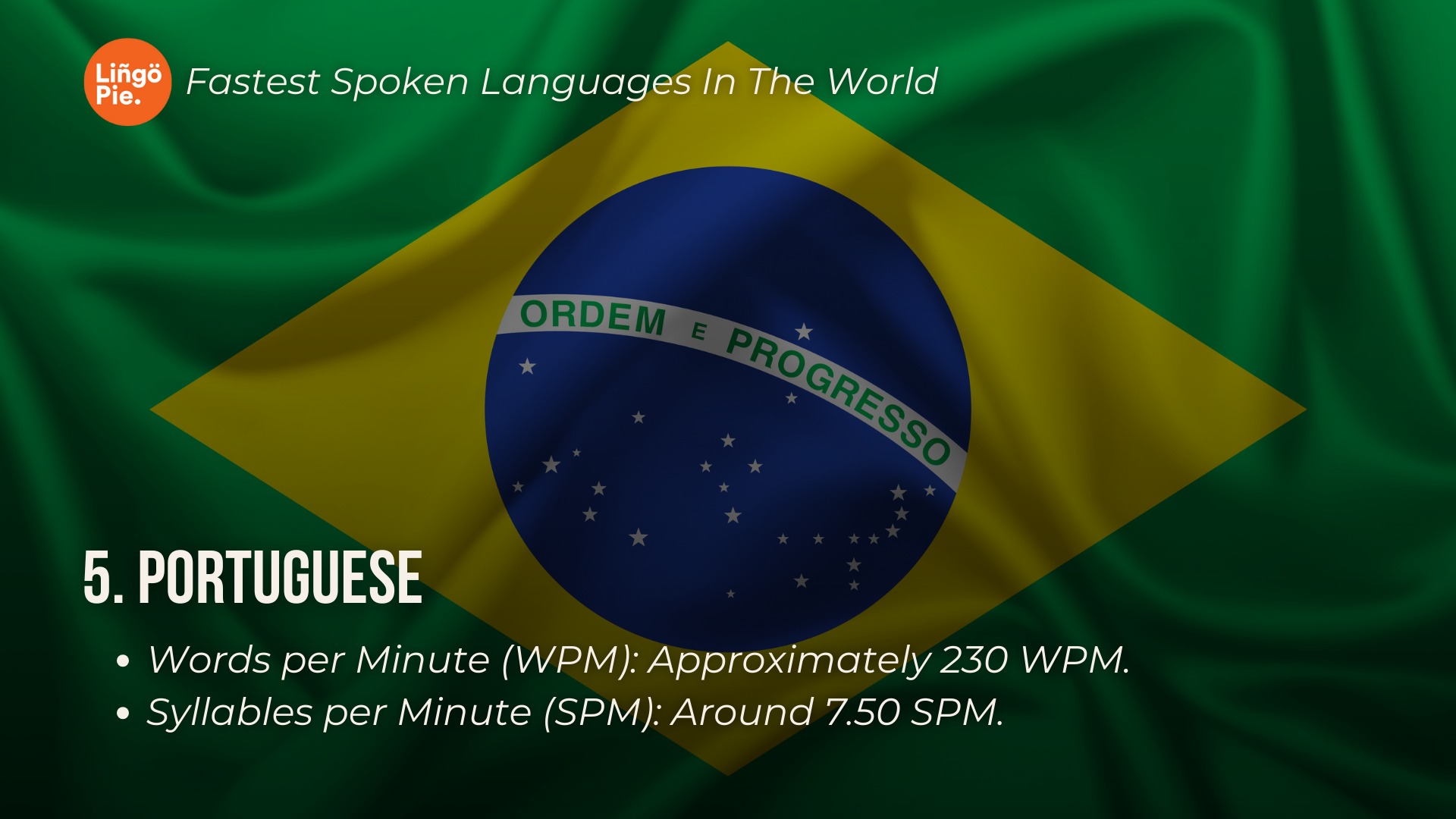
Portuguese is spoken by over 220 million people, primarily in Portugal, Brazil, and several African countries.
Speed Statistics:
- Words per Minute (WPM): Approximately 230 WPM.
- Syllables per Minute (SPM): Around 7.50 SPM.
Portuguese's swift speech reflects the cultural vibrancy of its speakers, particularly in Brazil, where musical traditions like samba and bossa nova influence the language's rhythm. The language's phonetic characteristics, including open vowels and clear consonants, contribute to its rapid and flowing speech.
6. Mandarin Chinese
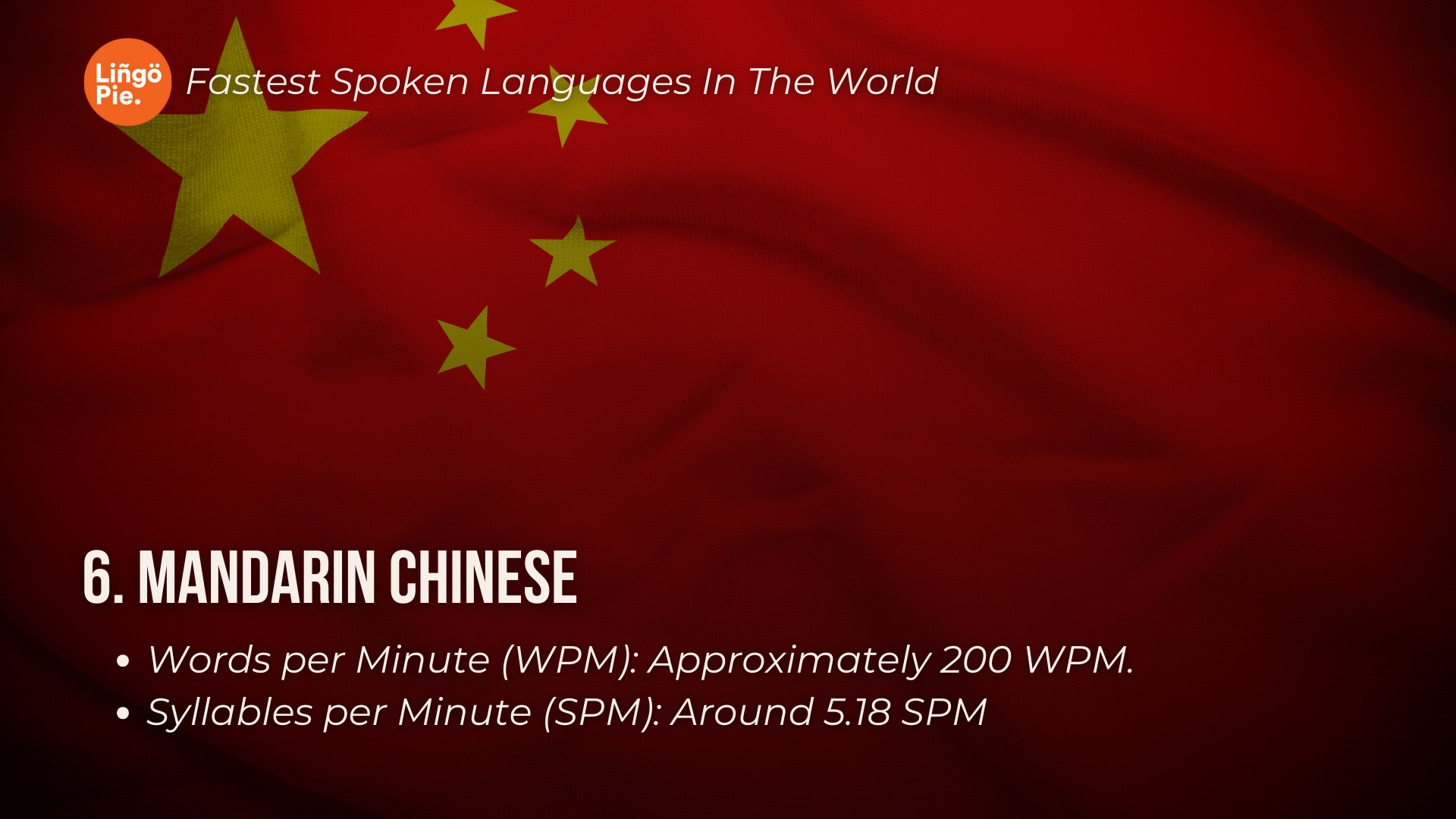
Mandarin Chinese is the most widely spoken language in the world, with over a billion native speakers primarily in China.
Speed Statistics:
- Words per Minute (WPM): Approximately 200 WPM.
- Syllables per Minute (SPM): Around 5.18 SPM.
Mandarin's moderate speech speed is balanced by its tonal nature, where pitch and intonation carry significant meaning. The efficiency in spoken Mandarin comes from its monosyllabic words and compact grammatical structures. The cultural emphasis on context and succinct expression influences the pace and delivery of the language.
7. Korean
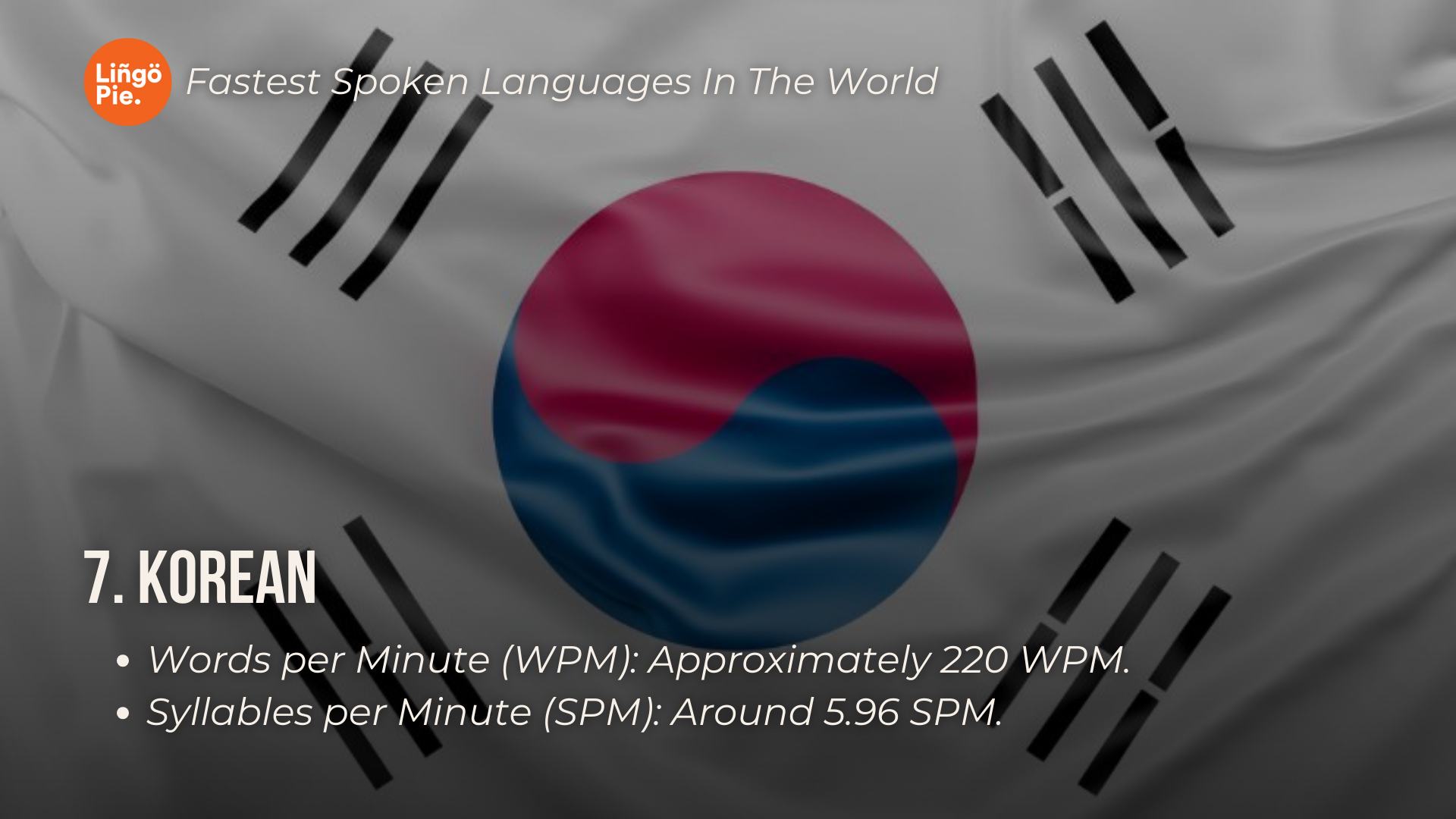
Korean is the official language of South Korea and North Korea, spoken by over 77 million people.
Speed Statistics:
- Words per Minute (WPM): Approximately 220 WPM.
- Syllables per Minute (SPM): Around 5.96 SPM.
Korean's fast speech rate can be attributed to the language's agglutinative nature, where words are often formed by stringing together various morphemes. This allows for the rapid expression of complex ideas. Korean culture's emphasis on efficiency and respect in communication also contributes to its quick pace.
8. Vietnamese
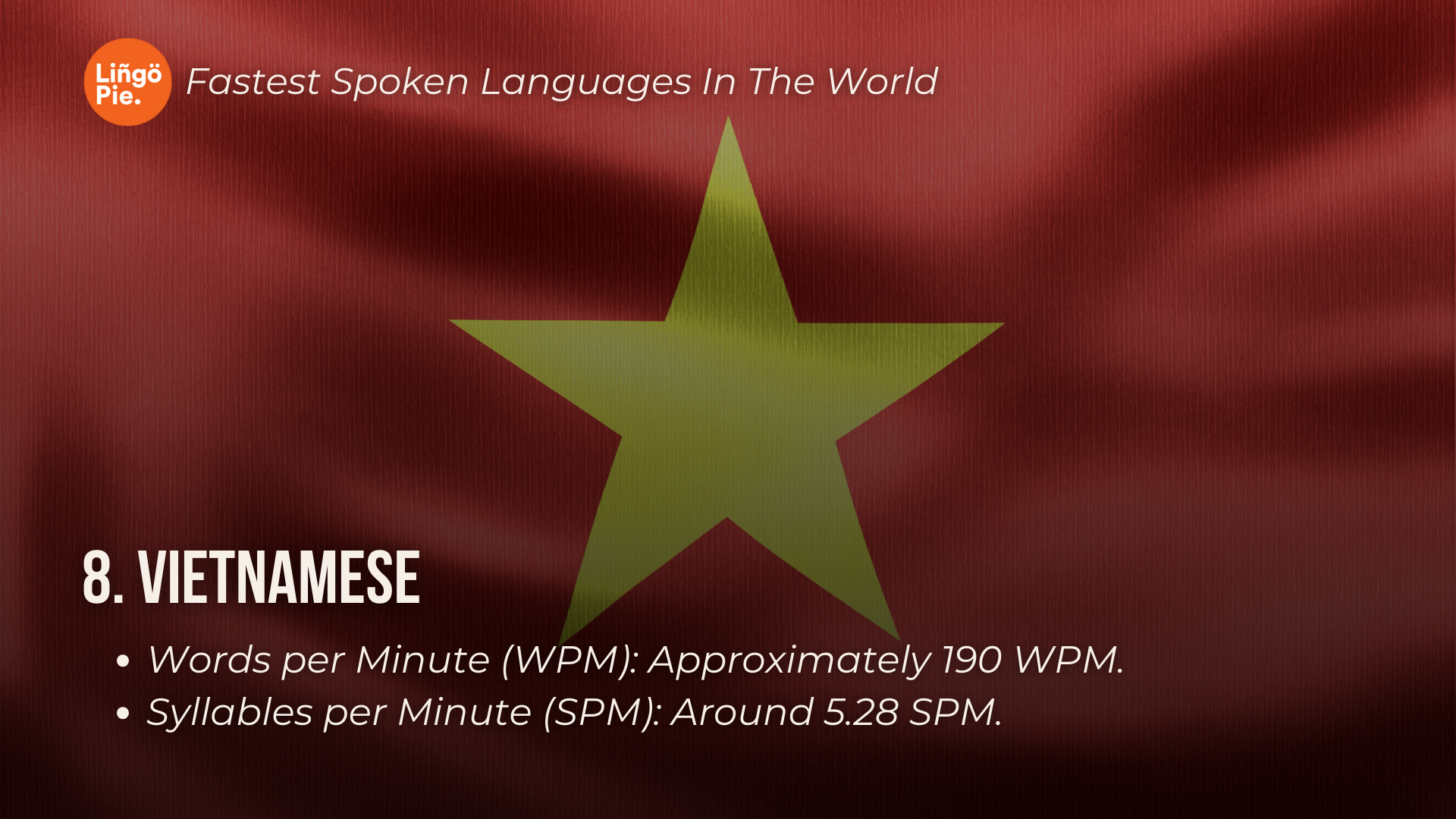
Vietnamese is the official language of Vietnam, spoken by over 90 million people.
Speed Statistics:
- Words per Minute (WPM): Approximately 190 WPM.
- Syllables per Minute (SPM): Around 5.28 SPM.
Vietnamese's moderate speech speed is influenced by its tonal nature and monosyllabic words. The cultural importance of concise and clear communication in Vietnamese society is reflected in the language's efficient and quick speech patterns.
9. Turkish
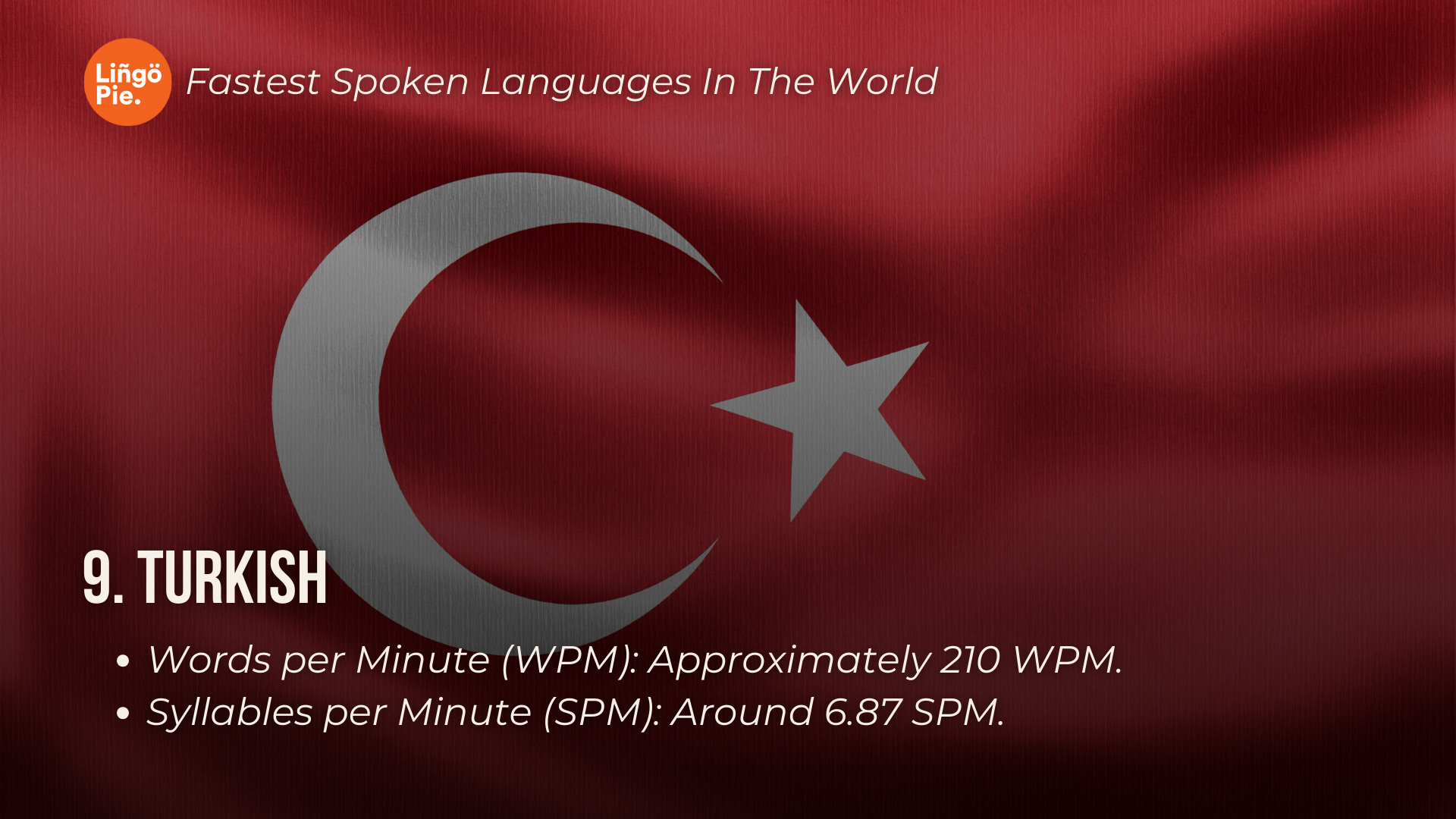
Turkish is spoken by over 75 million people, primarily in Turkey and Cyprus.
Speed Statistics:
- Words per Minute (WPM): Approximately 210 WPM.
- Syllables per Minute (SPM): Around 6.87 SPM.
Turkish's fast speech rate can be linked to its agglutinative structure, which allows speakers to convey complex meanings quickly by adding various suffixes to root words. The Turkish culture's emphasis on direct and effective communication is evident in the language's brisk pace.
10. Hindi
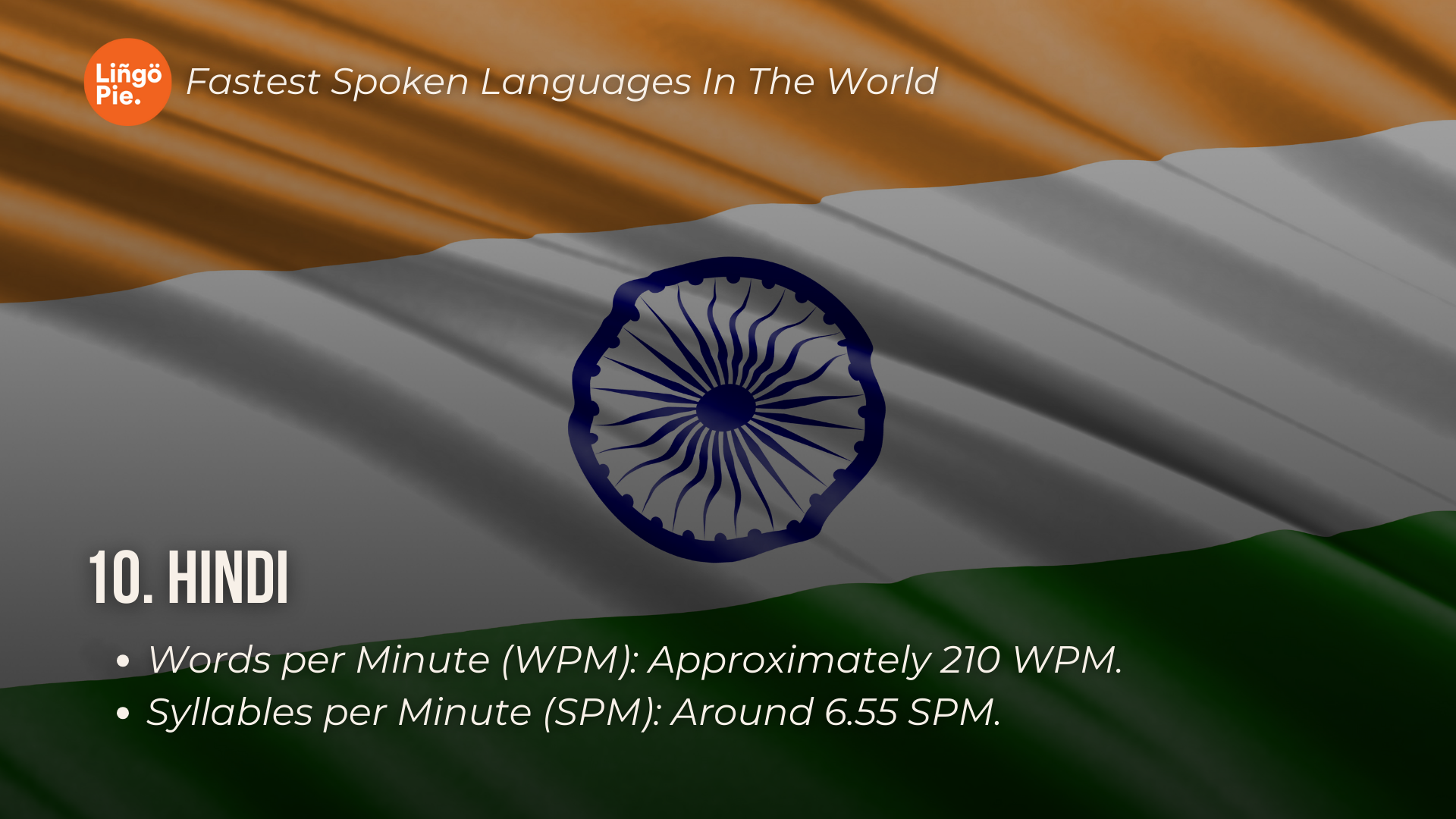
Hindi is one of the official languages of India, spoken by over 600 million people as a first or second language.
Speed Statistics:
- Words per Minute (WPM): Approximately 210 WPM.
- Syllables per Minute (SPM): Around 6.55 SPM.
Hindi's rapid speech rate reflects the dynamic and diverse nature of Indian society, where quick and efficient communication is often necessary in densely populated areas. The language's phonetic structure, with its clear vowels and consonants, supports a high rate of speech without sacrificing clarity.
Read Also:

What Are The Factors Influencing Speech Speed?
Phonetics
The phonetic composition of a language significantly impacts its speech rate. Languages with simpler syllabic structures and fewer phonemic distinctions can be spoken more quickly. For example, Japanese has a high syllable rate due to its simple consonant-vowel syllable structure, allowing for rapid articulation. In contrast, languages with complex consonant clusters and varied syllable structures, like English, might be spoken more slowly.
Grammar
The grammatical complexity of a language also plays a crucial role. Languages with a high degree of inflection or agglutination, where words are formed by adding multiple affixes, can convey more information in fewer words. This can lead to a higher speech rate, as seen in Turkish and Korean. Conversely, languages that rely heavily on word order and separate words for grammatical relations, like Mandarin Chinese, might have a slower word rate but can still maintain a high syllable rate due to monosyllabic words.
Social Norms
Cultural attitudes toward communication significantly influence speech speed. In cultures where brevity and efficiency are valued, such as in Japan, people tend to speak quickly to convey information swiftly. In contrast, cultures that value eloquence and detailed storytelling, such as some Arab cultures, might have a slower, more deliberate speech pattern.
Communication Styles
The general communication style of a culture affects how fast people speak. For instance, in Spanish-speaking countries, lively and animated conversations are common, contributing to the fast speech rate. The emphasis on expressiveness and emotional engagement in these cultures encourages a quicker pace to keep the interaction dynamic and engaging.
Read Also:
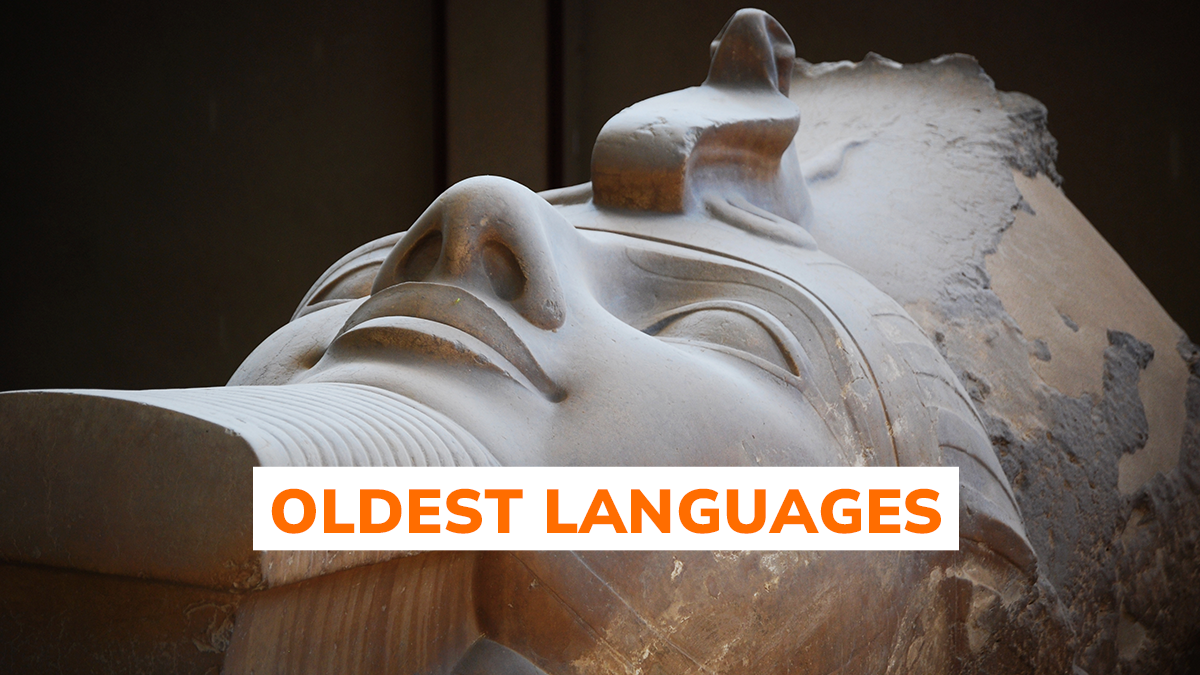

Frequently Asked Questions
1. Which language is spoken the quickest?
Japanese is often considered the quickest spoken language due to its rapid syllable rate and efficient communication style.
2. What is the fastest-growing language in the world?
English is the fastest-growing language in the world, largely due to its widespread use as a global lingua franca in business, education, and technology.
3. What are the fastest-spoken languages in the world?
The fastest-spoken languages include Japanese, Spanish, French, Italian, Portuguese, Korean, Vietnamese, Turkish, and Hindi, each known for their unique linguistic structures and cultural influences that contribute to their swift speech rates.
Final Words
The speed at which people speak different languages is influenced by the language's structure, cultural habits, and modern technology. For example, Japanese is spoken very quickly due to its simple syllables, while Spanish is fast because of its lively and expressive style.
By understanding why some languages are spoken faster than others, we can better appreciate the diversity of languages around the world. Whether you're learning a new language or just interested, exploring these fast languages can give you great insights into how people communicate.
Learn New Languages Through TV Shows With Lingopie!
Who says learning can’t be fun? Grab some popcorn and immerse yourself in foreign films or binge-watch TV shows. That's the mission of Lingopie, making language learning fun and immersive!
Lingopie makes learning a new language fun and effective by using real TV shows, movies, and documentaries. It offers interactive subtitles, so you can click on any word to get an instant translation and pronunciation.
The platform also personalizes content based on your progress, making sure you're always engaged. Words you click on are saved to flashcards for easy review, and there are quizzes to help you remember what you've learned. Plus, by watching different genres, you get a feel for the culture and language in real-life situations.
Download Lingopie from the App Store or Play Store now and get a FREE 7-day trial!








![How To Say Love In Different Languages [120+ Ways]](/blog/content/images/size/w300/2024/11/How-To-Say-Love-In-Different-Languages--120--Ways-.jpg)

